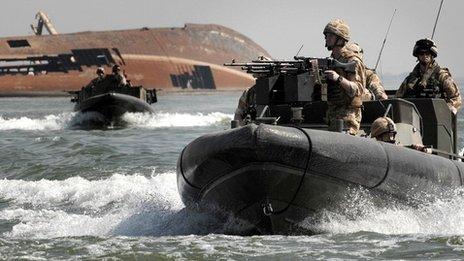Iraq Inquiry: Chilcot admits 'extra help' will be needed
- Published

The Iraq Inquiry will require "additional assistance" from the government to complete its work, chairman Sir John Chilcot has said.
In a letter to Tory MP Crispin Blunt, Sir John said he had discussed with officials what extra help would be needed "in its closing stages".
MPs and peers have criticised the time being taken and Sir John's reluctance to set a deadline for its completion.
But in the letter, Sir John insisted "significant progress" was being made.
The inquiry, which is looking into the UK's role in the US-led invasion of Iraq of 2003 and its aftermath, began its work in 2009.
The last public hearings took place in 2011 but progress has been delayed, first by drawn-out negotiations over what documents can be published alongside the report, and then by the process of so-called "Maxwellisation" - where those likely to be subject to criticism in the report are given a right to respond.
Appearing before MPs earlier this week, Cabinet Secretary Sir Jeremy Heywood - the UK's top civil servant - said Sir John had repeatedly turned down offers of extra resources in the past, saying they weren't needed.
'Not indefinite'
But in response to a letter from Mr Blunt, the chairman of the Commons Foreign Affairs Committee, Sir John suggested the inquiry would need to call on further support in the future to finish its report, set to be more than a million words long.
"Sir Jeremy and I had a constructive discussion about some steps that can be taken now to assist us in our work and the additional assistance that the inquiry will wish to call upon in its closing stages," he wrote.
Sir John, a former civil servant himself, said representations from key witnesses must be "evaluated carefully" before a timetable for completion could be set, adding that people were being given a "reasonable but not indefinite amount of time" to respond.
"Those involved in the Maxwellisation process have engaged fully and I continue to judge that no-one has taken an unreasonable length of time to respond given the range and complexity of the issues under consideration," he wrote.
"My judgement of what is unreasonable depends on the individual circumstances of each case."
David Cameron has said he is "fast losing patience" over the length of the inquiry while acknowledging that it is independent of government. Several MPs and peers have called for Parliament to take control of the process.
- Published21 July 2015

- Published5 July 2016
